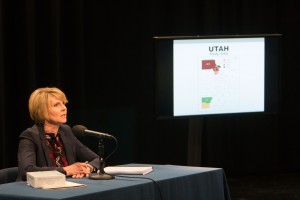
Greater understanding and state standardization in sexual assault kit processing are two things BYU nursing professor Julie Valentine believes will help mitigate Utah’s problem of low sexual assault kit submission.
Valentine, a certified Sexual Assault Nurse Examiner who has worked as a forensic nurse since 2006, suggested these solutions at a Thursday, April 7 press conference where she shared her research on Utah’s low sexual assault kit processing numbers.
“Although we’re talking about kits, we’re talking about people,” Valentine said.
Sexual assault kits include evidence collected during a medical examination with the assault victim. Completing the kits preserves evidence for criminal investigations.
Valentine studied the processing of 1,874 sexual assault kits in seven Utah counties between 2010 and 2013. Law enforcement only submitted 22.8 percent of the kits to the state crime laboratory for analysis in the year following the assaults.
FBI Uniform Crime reports show rape is Utah’s only violent crime above the national average, and it has been for the last 25 years. According to a 2007 report by Utah Commission on Criminal and Juvenile Justice, 1-in-3 women report sexual assault and 1-in-6 report rape.
Valentine studied four Utah areas, including Salt Lake, Washington and Iron counties. Box Elder, Weber, Davis and Morgan counties were studied as one site in northern Utah. These counties represent 65 percent of Utah’s population.
The study showed kits were 25 percent more likely to be submitted if they came from a suspected drug-facilitated assault; and male victims’ kits were 46 percent more likely to be submitted than female victims’.
Studies similar to Valentine’s conducted in the Midwest found sexual assault kit submission rates of approximately 60 percent, significantly higher than Utah’s 22.8 percent.
The healing process for victims is complicated when they don’t know whether the kit in their case has been processed. “Most victims realize they are dealing with a huge amount of stress,” Valentine said. “The trauma after being raped can forever change someone.”

The main variable affecting whether a kit was submitted was the location of the incident, according to Valentine. She compared the rape kits submitted in Washington and Iron counties. The kits in the jurisdiction of Iron County were almost 10 times more likely to be submitted than in Washington County, even though the counties are adjacent.
The remaining 62 percent of Utah’s un-submitted or pending sexual assault kits remain in a variety of places. Some are still in storage with law enforcement and are being turned in. Valentine is hopeful that numbers will continue to grow as the volume of unanalyzed kits raises public safety concerns, including the likelihood that investigations would better track crimes committed by serial rapists.
“Most repeat rapists are not jumping out of bushes, but they are individuals, perpetrators, that prey on those that are most vulnerable in our society,” Valentine said. “And then commit sexual assault after sexual assault on them.”
Valentine offered two possible solutions following her study. She recommended passing a state law to mandate standardized submission of sexual assault kits to state crime labs.
“This would remove the subjectivity that is absolutely apparent and it would remove that justice inequity that is occurring in the different jurisdictions on decisions to submit kits or not,” Valentine said.
She also suggested better educating of law enforcement, prosecution and all aspects of the criminal system on factors specific to sexual assault investigations.
Community members can also get involved by supporting the campaign “Start by Believing,” which looks at the perpetrators of the sexual violence instead of focusing on victim behavior and victim blaming.
“I’m very positive, even though these findings were not what I had hoped for and are very concerning,” Valentine said.
She spoke on the significance of statistics, without which, there would be “no measurement for improvement.”
“We have these findings, but we can work together, collaborative efforts throughout the state to make changes that will help our victims and help investigation and prosecution of sexual assault kits, and increase the submission rates of the sexual assault kits,” Valentine said.




